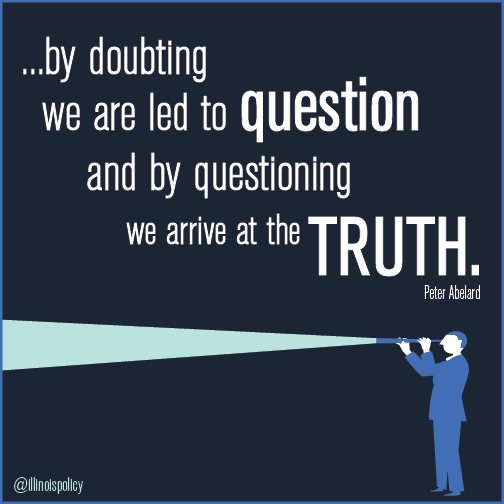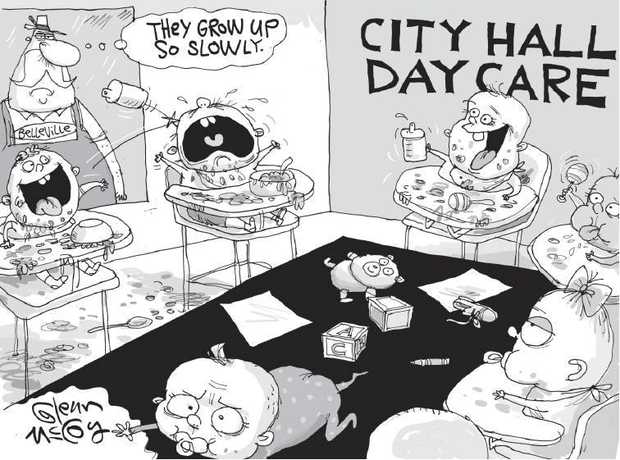QUOTE OF THE DAY
State Journal Register: Debate continues over success of health coverage signups in Illinois
The Get Covered Illinois campaign “successfully extended health coverage to over half-a-million people,” according to the state’s first annual report on the effort to carry out key parts of the Affordable Care Act.
The federal health care law “is making a real difference in the lives of Illinois residents,” Gov. Pat Quinn wrote in the report, issued by his administration last week.
Nowhere in the report, however, does it say how many of the 1.3 million uninsured Illinois adults eligible for coverage through the law were among the more than 600,000 people statewide who got coverage.
Thumbtack: Illinois Small Business Friendliness
Thumbtack, in partnership with the Ewing Marion Kauffman Foundation, has released Illinois’s results from the third annual Thumbtack.com Small Business Friendliness Survey. The study, drawing upon data from over 12,000 small business owners, provides new insights into state and local business environments across the nation.
“After a two-month survey of thousands of small business owners nationwide, Illinois’s small businesses have rated it near the bottom as one of the least friendly states in the nation towards small business,” says Jon Lieber, Chief Economist of Thumbtack. “Creating a business climate that is welcoming to small, dynamic businesses is more important than ever, and Illinois could be doing a lot better in creating this environment.”
Some of the key findings for Illinois include:
Ward Room: Patronage Charges May Prove Quinn’s Undoing
For a state that’s sent a number of sitting governors to prison, running for re-election as a reformer is a smart political strategy.
But it can prove to be a bit of an issue when your name is continually linked in the minds of voters with corruption and patronage scandals.
That’s the problem Democratic Governor Pat Quinn is facing as he runs for another term against Republican Bruce Rauner.
WirePoints: Not even fiddling while Illinois burns
The fate of Illinois will not be determined by most of this summer’s headline issues, important as some of them are. It will be determined by how the pension crisis is resolved — or not resolved. Hundreds of billions of dollars owed with very little available for payment have crippled all the myriad levels of government in Illinois, and some 200,000 public pensioners who either need or want their money (depending on their circumstances) will be facing cuts.
And the crisis is growing rapidly.
What’s been done in the past few months on pensions? The summer has been spent wringing hands over what the Illinois Supreme Court will do and little else. There’s no reported indication that anybody in Springfield has worked out, even behind the scenes, contingency options in anticipation of the next legislative session, different possible rulings from the court, or changes that may come from the November elections.
The World Bank: Nine Reasons why Corruption is a Destroyer of Human Prosperity
In an earlier blog post, we commented on the sources of corruption, the factors that have turned it into a powerful obstacle to sustainable economicdevelopment. We noted that the presence of dysfunctional and onerous regulations and poorly formulated policies, often created incentives for individuals and businesses to short-circuit them through the paying of bribes. We now turn to the consequences of corruption, to better understand why it is a destroyer of human prosperity.
First, corruption undermines government revenue and, therefore, limits the ability of the government to invest in productivity-enhancing areas. Where corruption is endemic, individuals will view paying taxes as a questionable business proposition. There is a delicate tension between the government in its role as tax collector and the business community and individuals as tax payers. The system works reasonably well when those who pay taxes feel that there is a good chance that they will see a future payoff, such as improvements in the country’s infrastructure, better schools and a better-trained and healthier workforce. Corruption sabotages this implicit contract. When corruption is allowed to flourish taxpayers will feel justified in finding creative ways to avoid paying taxes or, worse, become bribers themselves.
To the extent that corruption undermines revenue, it adversely affects government efforts to reduce poverty. Money that leaks out of the budget because of corruption will not be available to lighten the burden of the poor. Of course, corruption also undermines the case of those who argue that foreign aid can be an important element of the fight against global poverty—why should taxpayers in the richer countries be asked to support the lavish lifestyles of the kleptocrats in corrupt states?
CARTOON OF THE DAY

